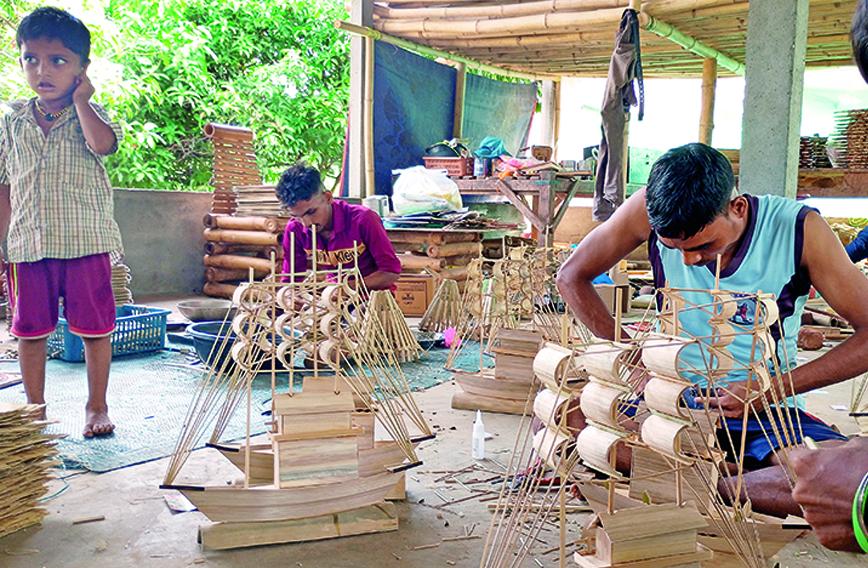
Ashwin’s workshop
You can fund an artisan directly now
Prashun Bhaumik, New Delhi
The 33-year-old Ashwin is from Khirmani, a small village of 91 families in Dang district of southern Gujarat. Mostly tribal, backward and poor, many villagers there depend on bamboo for a living.
The Aga Khan Rural Support Programme (AKRSP) works with bamboo craftspeople in the district, helping them with training and finding markets for their products. To get Ashwin a loan, AKRSP contacted Rang De, India’s only peer-to-peer lending platform, regulated by the Reserve Bank of India (RBI). Rang De provides credit to artisans, farmers and other unbanked communities through social investing.
This means any individual can lend directly to an artisan or farmer or micro-entrepreneur in several states through the Rang De website. The borrowers are listed. There is a farmer who needs a loan to buy goats, a woman who wants to expand her dairy and another who wants money to equip her welding shop. As an investor you get a decent rate of interest and at the end of the loan period you can get your money back or you can reinvest.
Rang De checked out Ashwin’s financial requirements and got social investors to lend him Rs 50,000.
Ashwin crafts pen stands and decorative items from bamboo which he sells in Rajasthan and Surendranagar in Saurashtra district. He was getting orders from other states but he couldn’t meet the demand since his workshop was very small. In 2021, he built a temporary shed in front of his house to accommodate his growing business. But, during the monsoon his leaky workshop became a liability. Still, he was able to generate a monthly income between Rs 7,000 and Rs 12,000.
AKRSP helped him construct a workshop after he got his loan. Ashwin now employs 15 workers, each earning a daily wage of Rs 250. He wants to tap into e-commerce, expand his product range and invest in technology and machinery to improve quality.
“Rural and tribal areas have the potential to generate large-scale employment through providing rural products and services. Since 2016, AKRSP has supported more than 2,000 young men to successfully set up business ventures. Our partnership with Rang De is helping these first-generation entrepreneurs get loans at very affordable rates to start new ventures or expand existing businesses,” says Vivek Singh of AKRSP.
Vijay bhai is another craftsman who benefitted from such a collaboration. For the past 10 years, he has been crafting bamboo handicrafts in Dang district. With the support of his family, he has turned his passion into a profitable business. Through a Rang De loan, Vijay was able to scale up his venture. His loan of Rs 50,000 funded by 11 Rang De Social Investors helped him purchase hardware and raw materials.
In India, over 200 million livelihoods are directly or indirectly connected to artisan communities, predominantly tribal. A typical artisan’s workshop has the potential to grow from a three-man operation to a unit employing 25 artisans over five years.
The AKRSP has been helping artisans and rural entrepreneurs in Gujarat, Maharashtra, Madhya Pradesh and Bihar get training, exposure and take their wares to exhibitions in cities such as Ahmedabad, Surat and Delhi, and establish crucial market linkages.
For credit AKRSP turns to Rang De. Ram N.K. and Smita Ram, who founded Rang De in 2008, say they were inspired by Muhammad Yunus, who pioneered microcredit and microfinance in Bangladesh and founded the Grameen Bank.
Rang De provides credit access at a low rate. The borrower has the flexibility to choose exactly when and how much they want to borrow. Social investors invest in an investee or fund of their choice starting with `100. Once a loan is fully funded through these investments, the funds are transferred directly to the investee’s bank account. The investee repays the loan according to a repayment schedule, and the social investors receive these repayments in the form of Rang De credit in their dashboard.
This credit can be reinvested or withdrawn to the social investor’s bank account. Rang De works with a network of impact partners or NGOs across the country that identifies individuals who need credit within the communities they work with.
These organizations identify communities engaged in sustainable livelihoods but who do not have access to institutional credit. They mentor these communities in effectively utilizing and repaying this credit, leading to an excellent repayment rate.
Loan repayment has been good, confirms Sukhada Chaudhury, vice president, communications, at Rang De. More than 90 percent of borrowers pay on time. She says that Rang De has given out 18,411 loans totalling more than Rs 600 million from the time it was regulated by the RBI as a Non-Banking Financial Company (NBFC) in September 2019.
Rang De’s loans make it easier for artisans to procure raw materials upfront and pay for transport and operating costs, helping them increase their earnings roughly from Rs 10,000 a month to a net income of Rs 7 lakh to Rs 8 lakh per year.
Comments
-

Radhika - Dec. 14, 2023, 11:05 a.m.
This is such an interesting initiative! Hats off to all those who conceptualize such noble endeavors. I hope this goes a long way to protect our remarkable artisans and their brilliant work.
-

Jayant Sarnaik - Nov. 26, 2023, 12:46 p.m.
Dear Umesh, Thanks. This is a great initiative. But the transaction costs in terms of time spent in waiting and time spent in convincing the retail investor would be too high to secure a tiny investment of INR 50,000. There are many other issues related to scaling up of impact of such small investments which crop up when things start getting little better. It is a long road ahead. What do you think? Best Jayant




